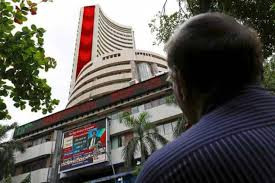Sensex Drops Over 130 Points, Nifty Slips Below 24,850 as Fed Signals and Geopolitical Worries Rattle Markets

IIE DIGITAL DESK : Indian stock markets ended lower on Tuesday as investor sentiment took a hit from global cues, including the U.S. Federal Reserve’s cautious stance on rate cuts and escalating geopolitical tensions in West Asia. The BSE Sensex declined by 134.51 points to close at 81,896.13, while the NSE Nifty slipped 42.95 points to settle at 24,840.05, falling below the crucial 24,850 level after hovering near record highs in previous sessions.
Markets opened weak amid nervous global sentiment and remained under pressure throughout the session. The sell-off was broad-based with particular weakness seen in IT, banking, and metal stocks, while selective buying in FMCG and energy shares helped cushion the fall to some extent.
Investors remained wary after the U.S. Federal Reserve, in its recent commentary, signaled just one interest rate cut in 2024, contrary to previous expectations of at least two. The Fed’s hawkish tone indicated that inflation remains a concern, dampening hopes of a swift monetary easing cycle. This led to risk aversion across global equity markets, including in India, as foreign portfolio investors (FPIs) reassessed their positions in emerging markets.
Adding to investor nervousness were renewed geopolitical tensions in the Middle East, particularly the increasing hostilities involving Israel and Lebanon's Hezbollah. Reports of cross-border skirmishes and fears of a wider regional conflict prompted a rise in global crude oil prices and drove investors toward safe-haven assets like gold and the U.S. dollar.
Brent crude climbed above $85 per barrel, raising concerns of imported inflation and a potential drag on India’s current account. This further hurt domestic market sentiment, particularly in sectors like aviation and oil marketing, which are sensitive to oil price fluctuations.
On the sectoral front, Nifty IT was the worst performer, falling over 1%, as fears over global tech spending and rising bond yields in the U.S. weighed on the outlook for Indian software exporters. Major tech players like Infosys, Wipro, and TCS ended in the red.
The Bank Nifty also underperformed, dragged down by weakness in large private banks like HDFC Bank, Axis Bank, and ICICI Bank. Concerns over loan book quality amid rising interest rates globally have made investors cautious.
FMCG and select PSU energy stocks bucked the trend, offering some support to the benchmark indices. Hindustan Unilever, ITC, ONGC, and Coal India saw modest gains on the back of safe-haven buying and strength in defensives.
Midcap and smallcap indices saw mixed action. While some profit booking was evident in the broader markets, selective stock-specific buying kept the volatility alive. The India VIX, a key gauge of market volatility, edged up nearly 2%, reflecting rising investor anxiety.
Despite today’s fall, analysts believe the broader trend remains upward, although short-term caution is warranted. With corporate earnings season around the corner, and global economic uncertainty prevailing, traders are expected to tread carefully.
“Markets are in a consolidation phase after a strong run-up. The Fed’s commentary and geopolitical developments have created temporary headwinds. However, domestic macros remain strong, and any meaningful dip could attract buying interest,” said an equity strategist from a leading brokerage firm.
Foreign institutional investors (FIIs), who have been net buyers in recent sessions, turned cautious. According to provisional data, they were net sellers to the tune of ₹512 crore on Tuesday, while domestic institutional investors (DIIs) remained net buyers.
As investors keep a close eye on upcoming economic data from both India and the U.S., including inflation and GDP figures, market participants are bracing for a volatile but range-bound movement in the near term.
While the Indian markets remain fundamentally strong, global factors are currently driving sentiment, and traders will likely stay on edge until more clarity emerges from both the geopolitical front and the U.S. monetary policy direction.
You might also like!
















